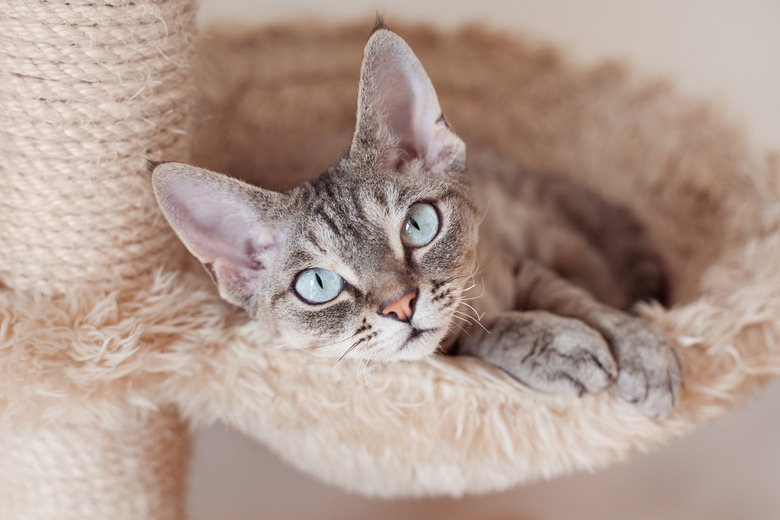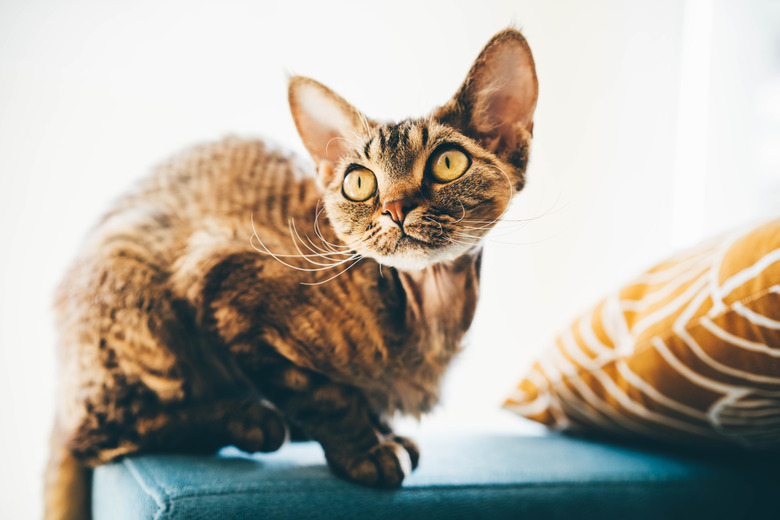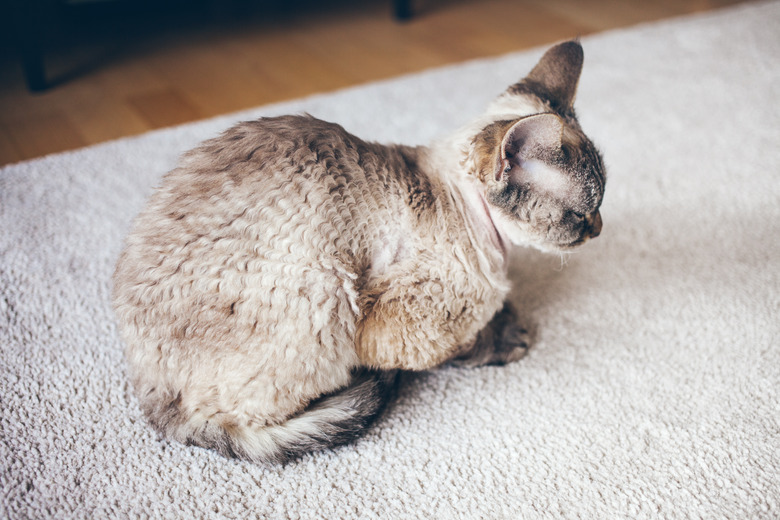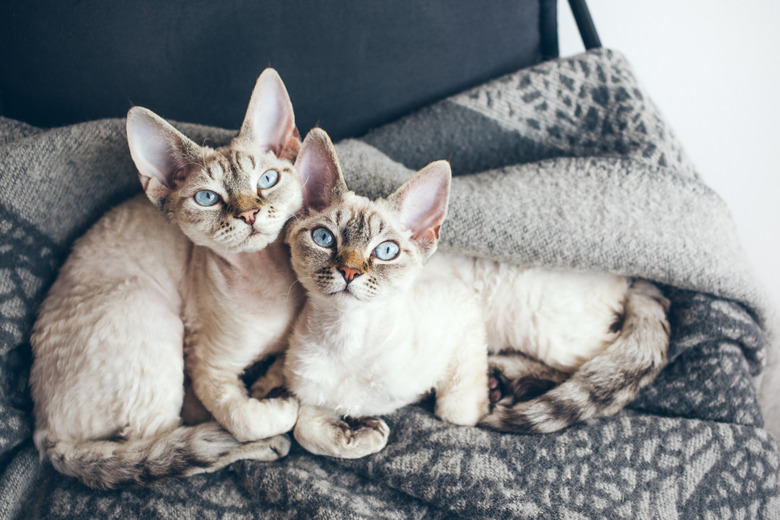Devon Rex Cat Breed Characteristics
Devon rex quick facts
Devon rex quick facts
Length: 12 – 16 inches
Weight: Females: 5 – 7 pounds, males 7 – 9 pounds
Lifespan: 14 – 17 years or more
Coat length: Short
Coloring: All coat colors
Grooming needs: Low
Friendliness: Breed alone is not an accurate predictor of individual cats' personalities. However, Devon rex cats are generally regarded as active and playful.
The Devon rex, or pixie cat, is a unique breed. If you are looking for a medium-sized cat that will stick to you like glue — this may be the cat for you. They have very short, curly hair and they rarely shed, and can be a good choice if you have a family member that suffers from allergies. However, the breed isn't completely hypoallergenic. The breed has large ears that give them an elfin or pixie-like appearance, although many affectionately claim they look like Gremlins or Yoda. Consider the cat's personality and care needs carefully before bringing a Devon rex kitten into your home.
Devon rex cat history
Devon rex cat history
The Devon rex can be traced back to a feral cat in Buckfastleigh, Devon, England. The male cat had short curly hair. He went on to breed a female tortoiseshell and white cat owned by Beryl Cox in the late 1950s.
One of the kittens also had a curly coat from this breeding. That kitten was named Kirlee and he was used to continuing to develop the Devon rex breed. Unfortunately, he died in 1970, when he was hit by a car.
It was discovered that the gene causing the unique coat was different than the one that creates the curly or wavy coat of the Cornish rex cat breed. Unlike the Cornish rex, the Devon rex cat breed has stubby whiskers or no whiskers at all, large eyes and ears, high cheekbones, and a short nose.
Devon rex cat personality
Devon rex cat personality
The Devon rex breed of cat is active, playful, and incredibly social. They are intelligent and curious cats and they will explore every nook and cranny. The cats tend to be quite relaxed and enjoy having children and other pets around in the home as playmates.
They are also quite dog-like in some ways, most notably, in their sense of loyalty. This means they will likely be following you as you move around the home. They may enjoy cuddling in your lap when you are still. Or even perching on your shoulder when they are allowed. The cats can also be quite vocal and may trill, coo, and chirp.
Devon rex cat lifespan and health issues
Devon rex cat lifespan and health issues
The Devon rex can live to be up to 17 years old or more — if they are healthy and receive proper care. They are generally a very healthy breed. However, there are a couple of genetic health problems that affect the breed. Responsible breeders will conduct genetic testing on their cats and avoid breeding any cat that may carry a genetic condition.
Devon rex myopathy is a genetic condition that affects both the Devon rex and Sphynx cat breeds. Some common symptoms of the disease include:
- muscle weakness and tremors, especially in the muscles of the neck and head
- head bobbing or shaking and carrying the head at a lower level than normal
- high stepping with their front legs
- protruding shoulder blades, leading to possible collapsing episodes during exercise
- laryngospasms and throat obstruction from food that can lead to death
Symptoms first appear in Devon rex kittens when they are three weeks to six months of age. The symptoms progressively worsen for six to nine months before stabilizing in most cats. The progression of the disease is typically gradual. Though cats may experience worsening symptoms over their lifetime. No treatment or cure is available. Many cats with the condition die from laryngospasms and throat obstruction from food.
Another concern is hypertrophic cardiomyopathy. This progressive condition is a genetic heart disease in cats. It causes a thickening of the heart wall. While there is no cure for this disease, its symptoms can be managed.
Some cats may also suffer from patellar luxation, a condition that causes the kneecap or patella to be out of place. Your veterinarian can diagnose this condition with a physical examination and x-rays.
Devon rex cat grooming and care
Devon rex cat grooming and care
The Devon rex is a low-maintenance cat when it comes to grooming. They have short, modified guard hair, and a minimal amount of undercoat. They rarely shed, and in most cases, brushing is not required. However, their skin can get oily at times, so an occasional bath can be beneficial. Make sure you use a gentle shampoo designed for cats.
Other regular grooming requirements include:
- checking and trimming the cat's nails once per week
- cleaning their ears regularly
- brushing their teeth with toothpaste designed for cats
Feed the Devon rex a high-quality commercial cat food in the amount recommended by your veterinarian. In general, feed the cat twice per day. Some cats prefer to have food available at all times so that they can snack. Be sure to monitor your cat's weight and stop free feeding if they start to gain weight as this can be detrimental to their health. Fresh drinking water should be available at all times.
Due to the cat's short coat, they may get cold more easily than other breeds. The thin Devon rex coat also leaves them susceptible to sunburn. The Devon rex should be kept as an indoor cat. Make sure they have a warm room and cozy bed to retreat to in case they get cold.
Welcoming a new cat into your home
Welcoming a new cat into your home
Before bringing an adorable curly-coated kitten into your home, it is important to cat-proof the house. These curious kittens may get into anything, especially if they are bored from being alone. Make sure there is nothing that the cats can get into that may harm them.
When you first bring the cat home, put them in a single room. Make sure hiding spots where the kitten may get stuck are closed off such as under chairs or between heavy furniture. Set up the room with everything the new cat may need including:
- food and water
- litter box
- scratching post
- cat tree
- toys
Spend plenty of time with your new kitten but allow them to explore on their own and come to you for attention when they are ready. Introduce the new cat to any other household pets through the door at first so that they can get used to each other. Use plenty of positive reinforcement when training and socializing. When the cat is comfortable, you can open the door and allow them access to more of the house.



